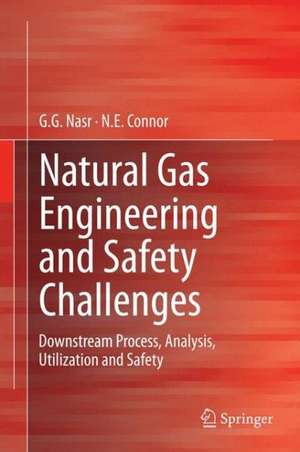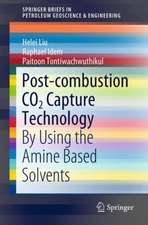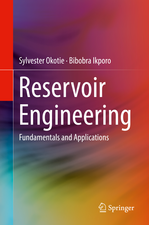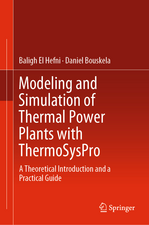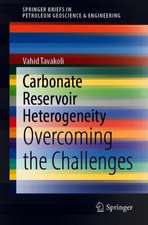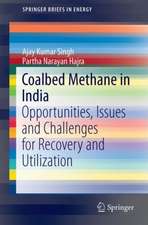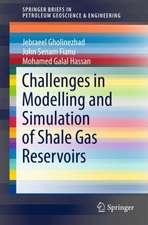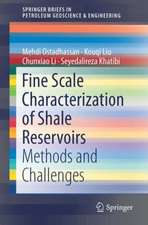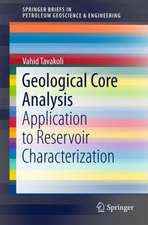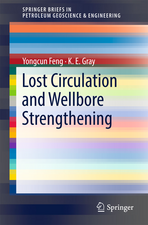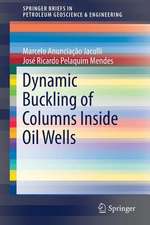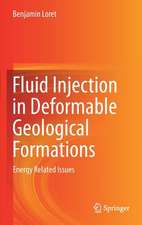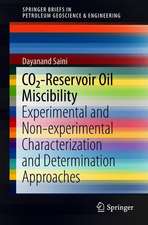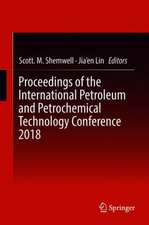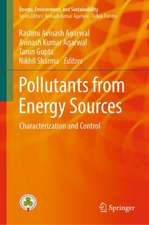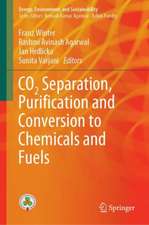Natural Gas Engineering and Safety Challenges: Downstream Process, Analysis, Utilization and Safety
Autor G.G. Nasr, N.E. Connoren Limba Engleză Hardback – 15 aug 2014
Featuring extensive coverage of the design and pipeline failures and safety challenges in terms of fire and explosions relating to the downstream of natural gas technology, the book covers the needs of practising engineers from different disciplines, who may include project and operations managers, planning and design engineers as well as undergraduate and postgraduate students in the field of gas, petroleum and chemical engineering.
This book also includes several case studies to illustrate the analysis of the downstream process in the gas and oil industry. Of interest to researchers is the field of flame and mitigation of explosion: the fundamental processes involved are also discussed, including outlines of contemporary and possible future research and challenges in the different fields.
| Toate formatele și edițiile | Preț | Express |
|---|---|---|
| Paperback (1) | 950.96 lei 6-8 săpt. | |
| Springer International Publishing – 23 aug 2016 | 950.96 lei 6-8 săpt. | |
| Hardback (1) | 1392.65 lei 6-8 săpt. | |
| Springer International Publishing – 15 aug 2014 | 1392.65 lei 6-8 săpt. |
Preț: 1392.65 lei
Preț vechi: 1698.34 lei
-18% Nou
Puncte Express: 2089
Preț estimativ în valută:
266.48€ • 279.23$ • 220.30£
266.48€ • 279.23$ • 220.30£
Carte tipărită la comandă
Livrare economică 11-25 aprilie
Preluare comenzi: 021 569.72.76
Specificații
ISBN-13: 9783319089478
ISBN-10: 3319089471
Pagini: 402
Ilustrații: XXVIII, 402 p. 239 illus., 28 illus. in color.
Dimensiuni: 155 x 235 x 30 mm
Greutate: 0.78 kg
Ediția:2014
Editura: Springer International Publishing
Colecția Springer
Locul publicării:Cham, Switzerland
ISBN-10: 3319089471
Pagini: 402
Ilustrații: XXVIII, 402 p. 239 illus., 28 illus. in color.
Dimensiuni: 155 x 235 x 30 mm
Greutate: 0.78 kg
Ediția:2014
Editura: Springer International Publishing
Colecția Springer
Locul publicării:Cham, Switzerland
Public țintă
Professional/practitionerCuprins
Fundamental and Natural Gas Principles.- Transmission and Distribution Systems and Design.- Liquefied Natural Gas (LNG).- Gas Flow and Network Analysis.- Natural Gas Measurement Systems.- Pipeline Failure Modes and Facture Propagation.- Asset and Risk Management.- Fire and Explosion.- Industrial Utilization of Natural Gas.- Project and Business Management of Natural Gas.- Research and Innovation In Natural Gas Engineering.
Notă biografică
Ghasem G. Nasr is Professor of Mechanical Engineering and Innovation at University of Salford, Manchester, England and he is the head of Petroleum and Gas Engineering in the School of Computing, Science and Engineering (CSE) and Director of sprays and petroleum technology research groups. Graduating in Mechanical Engineering, Fuel Technology (PgDip) and Energy Science (MSc) at the University of Middlesex and Sussex University respectively and Heat Transfer and Fluid Mechanics (PhD) at the University of Swansea, he moved into project engineering management and energy utilization between 1988 to 1995 to Tata Steel, Wales and subsequently acted as a Senior Consultant in Europe and Middle East before moving to the University College of Manchester (now Stockport College) managing the engineering department. He then joined the University of Salford in 2001 as a leader of Gas Engineering and Management. He has over 25 years’ experience in innovation and research in many areas of spray production and gas utilization and has been consultant to over 120 companies in New Product Development (NPD), innovation and research. He was a founder of ‘Spray Research Group’ and has authored 130 papers, including editorship of books and journals, and acquired 7 patents and was a lead author of the book Industrial Sprays and Atomisation (SV, 2001). He has also held a number of executive appointments in various academic, professional and steering committees. Currently he is a member of PDC of IGEM and Executive Member of steering committee of Praxis-Global. He has also been guest speakers on many international platforms and delivered over 100 advanced short courses in various related subjects. He is a Chartered Engineer, a Fellow of the Institution of Gas Engineers and Managers (FIGEM) and of the Institute of Mechanical Engineers (FIMechE) and Member of FEANI EurIng and ILASS (Institute of Liquid Atomisation and Spraying Systems). Recently he has been appointed as adirector of Technology and Innovation at the Salvalco Ltd.
Norman E. Conner joined the North Western Gas Board as a student engineer in 1950 and began studying Mechanical Engineering at Warrington and St. Helens Technical Colleges. In 1953 he was awarded a Whitworth Society prize and a Technical State Scholarship to study Gas Engineering at the University of Leeds, graduating in 1957 with an Honors B.Sc., Degree. He returned to the North Western Gas Board as a production engineer in the South Lancashire group and was appointed Chief Chemist at the Warrington Production Station in 1958. In 1964 he left to take up an appointment as a Lecturer in Gas Engineering at the Royal College of Advanced Technology, Salford. He is a Chartered Engineer, a Fellow of the Institution of Gas Engineers and Managers and of the Energy Institute. He represented the University on the IGEM Education, Training and Academic Committees for many years and has been Chairman of the North Western Section of E.I., and the Manchester Gas Association. He received an M.Sc., Degree and Senior Lectureship in 1977. During his career he was actively involved in running Conferences/ Symposia in gas engineering, fuel utilisation and chemical engineering at the University. He is also a co-author of: Industrial Gas Utilisation Engineering Principles and Practice Bowker 1977. He was involved in setting up and teaching on the M.Sc., course in Gas Engineering and Management with colleagues (A.L Bowler and Dr. R. Pritchard) in the late eighties, later becoming Course Director. He is still actively involved in the Gas and Petroleum Engineering program at the University.
Norman E. Conner joined the North Western Gas Board as a student engineer in 1950 and began studying Mechanical Engineering at Warrington and St. Helens Technical Colleges. In 1953 he was awarded a Whitworth Society prize and a Technical State Scholarship to study Gas Engineering at the University of Leeds, graduating in 1957 with an Honors B.Sc., Degree. He returned to the North Western Gas Board as a production engineer in the South Lancashire group and was appointed Chief Chemist at the Warrington Production Station in 1958. In 1964 he left to take up an appointment as a Lecturer in Gas Engineering at the Royal College of Advanced Technology, Salford. He is a Chartered Engineer, a Fellow of the Institution of Gas Engineers and Managers and of the Energy Institute. He represented the University on the IGEM Education, Training and Academic Committees for many years and has been Chairman of the North Western Section of E.I., and the Manchester Gas Association. He received an M.Sc., Degree and Senior Lectureship in 1977. During his career he was actively involved in running Conferences/ Symposia in gas engineering, fuel utilisation and chemical engineering at the University. He is also a co-author of: Industrial Gas Utilisation Engineering Principles and Practice Bowker 1977. He was involved in setting up and teaching on the M.Sc., course in Gas Engineering and Management with colleagues (A.L Bowler and Dr. R. Pritchard) in the late eighties, later becoming Course Director. He is still actively involved in the Gas and Petroleum Engineering program at the University.
Textul de pe ultima copertă
Providing a critical and extensive compilation of the downstream processes of natural gas that involve the principle of gas processing , transmission and distribution, gas flow and network analysis, instrumentation and measurement systems and its utilisation, this book also serves to enrich readers understanding of the business and management aspects of natural gas and highlights some of the recent research and innovations in the field.
Featuring extensive coverage of the design and pipeline failures and safety challenges in terms of fire and explosions relating to the downstream of natural gas technology, the book covers the needs of practising engineers from different disciplines, who may include project and operations managers, planning and design engineers as well as undergraduate and postgraduate students in the field of gas, petroleum and chemical engineering.
This book also includes several case studies to illustrate the analysis of the downstream process in the gas and oil industry. Of interest to researchers is the field of flame and mitigation of explosion: the fundamental processes involved are also discussed, including outlines of contemporary and possible future research and challenges in the different fields.
Featuring extensive coverage of the design and pipeline failures and safety challenges in terms of fire and explosions relating to the downstream of natural gas technology, the book covers the needs of practising engineers from different disciplines, who may include project and operations managers, planning and design engineers as well as undergraduate and postgraduate students in the field of gas, petroleum and chemical engineering.
This book also includes several case studies to illustrate the analysis of the downstream process in the gas and oil industry. Of interest to researchers is the field of flame and mitigation of explosion: the fundamental processes involved are also discussed, including outlines of contemporary and possible future research and challenges in the different fields.
Caracteristici
Provides a critical and extensive compilation of the downstream processes of natural gas that involve the principle of gas processing , transmission and distribution, gas flow and network analysis, instrumentation and measurement systems and its utilisation Enriches understanding of the business and management aspects of natural gas as well as highlighting some of the recent research and innovations in the field Covers the needs of practising engineers from different disciplines, who may include project managers, planning and design engineers – the book is also suitable for the demands of undergraduate and postgraduate students in the field of gas, petroleum and chemical engineering Includes supplementary material: sn.pub/extras
